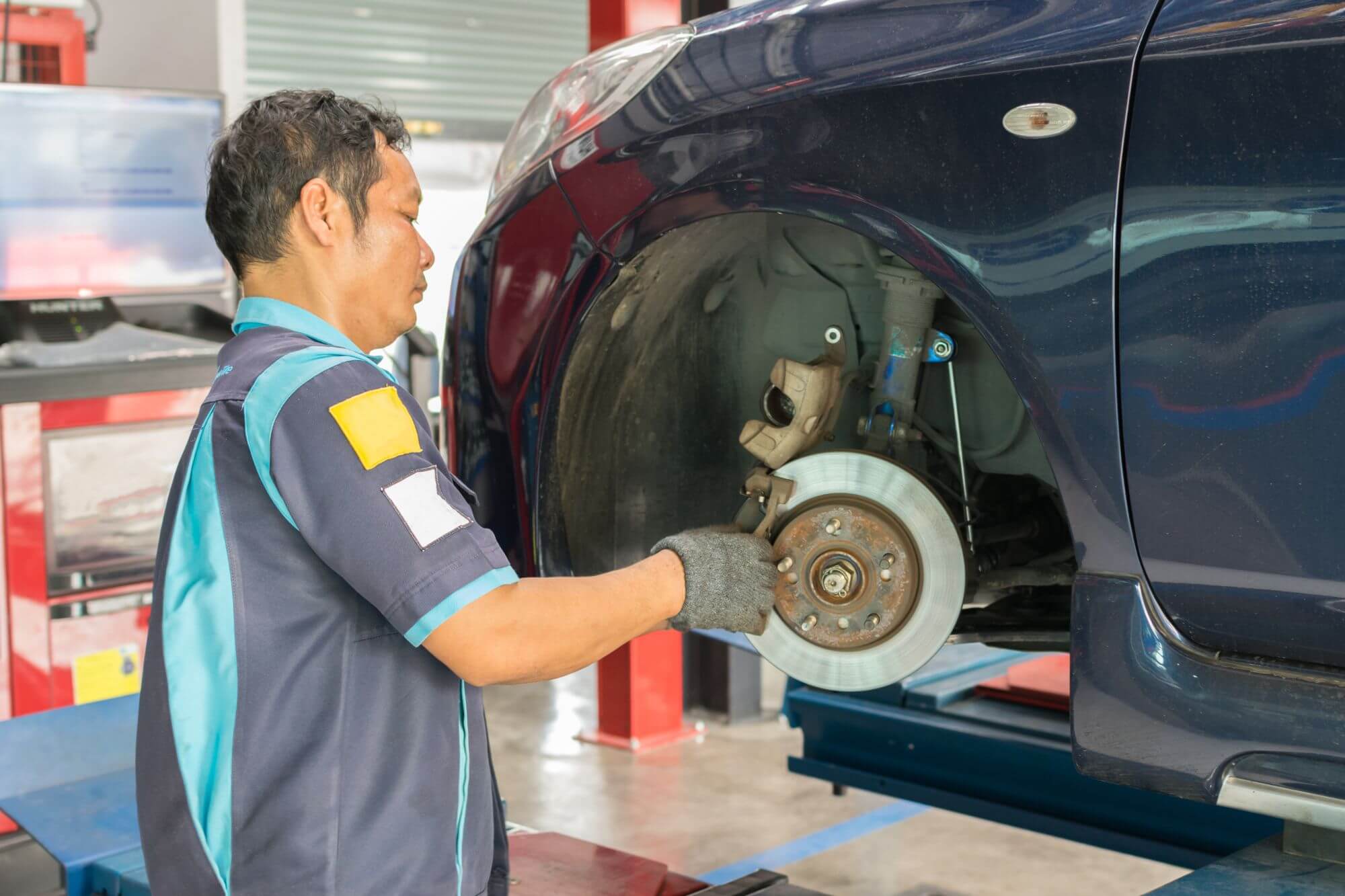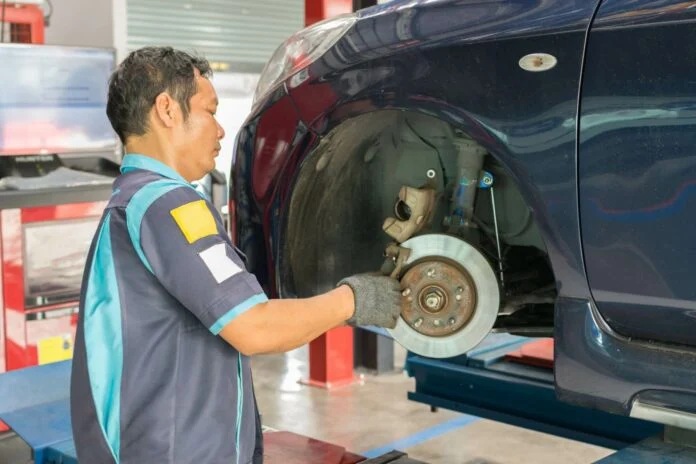Your brakes are the only thing responsible for slowing down and stopping your vehicle on the road. Yet, many drivers seem content to continue driving even when they notice something is off with their brakes.
This is extremely dangerous as faulty brakes can stop working at any time and the result, more often than not, is fatal. Therefore, it’s always vital to pay attention to the condition of your brakes and get them fixed as soon as possible.
To help you take care of your brakes and stay safe on the road, here are the warning signs that your brakes are failing.

1. The Brake Warning Light Comes On
The brake warning light usually indicates that the parking brake is engaged but if the light stays on even after you release the brake, it could mean the brake fluid level in the master cylinder is low.
When you press the brake pedal, the master cylinder is actuated and compresses the fluid in the brake lines. The fluid then transfers the pressure to your brake calipers or shoes, creating friction on the brake discs or drums to stop your car. A low fluid level in the brake master cylinder is usually caused by leaks in the brake system, so the brake warning light could also mean that you have a leak somewhere in your brake system.
Read More: A Guide to Car Warning Lights and Indicators
2. Noise from the Brakes
Having noises while braking doesn’t always signify faulty brakes. If your brakes make a squealing sound, it could be caused by debris or a light layer of rust on the brakes and should go away after a few minutes of driving. However, it could also mean that one or more of your brake pads are already running thin, exposing the brake wear indicator. This indicator is a piece of metal in your brake pad that’s designed to produce a high-pitched sound when you brake, thus letting you know it’s time to change your brake pads.
However, if you hear a grinding sound when braking, it could be a warning sign that your brake pads are fully worn down and your brake discs are grinding against metal which could damage them. This is a sure sign that your brakes are faulty and should be looked at by a mechanic.
3. The Brakes Feel Soft or Spongy
When you press the brake pedal, you should feel solid resistance under your foot. If your brakes feel soft or if the pedal touches the floorboard, then it’s time to check your brake system. Hydraulic brake fluid doesn’t compress, which is why it works so well at transferring the right amount of pressure to your brakes to stop the car.
A soft brake pedal often means you have air or moisture in the brake system impairing the function of the brake fluid. Soft brakes could also mean the master cylinder isn’t working properly. Whichever the cause, having soft or spongy brakes is dangerous especially if you need to sudden brake.

Read More: Why You Should Visit the New CARSOME Service Center
4. Vibrating or Wobbling Steering Wheels While Braking
If your steering wheel vibrates during braking, you most likely have warped or uneven brake discs. When you brake, the brake pads squeeze the discs to slow down your vehicle. However, if the pad bites down on an uneven disc, it will wobble following the bumps on the disc surface and transfer that force up the steering wheel.
If left unchecked, your brake pads and discs will not only wear down unevenly but also prematurely. Solving this problem involves either skimming or resurfacing the brake discs, or replacing them altogether. Skimming involves shaving off a thin layer of the disc to even it out so the pad can properly bite down on it. However, this should only be done if your brake discs are thick enough. Otherwise, replacing them is the best option.

How a brake disc is skimmed [Image credit: cartreatments.com]
5. Leaking Brake Fluid
Leaking brake fluid is a serious warning sign of faulty brakes as the lack of hydraulic fluid in the brake lines always leads to reduced braking performance. The leak usually occurs at the brake master cylinder which is located at the top of the firewall, on the driver’s side of the engine bay. The cylinder is attached to the bottom of the brake fluid reservoir so it should be fairly easy to locate.
But if the leak occurs on the brake lines, it will be more difficult to locate. You can identify if you have leaking brake fluid by noticing if there’s any pool of liquid under your car when you park and by checking the fluid level in the brake fluid reservoir. Brake fluid has a similar consistency as vegetable oil and is usually light yellow when new and turns darker or brown as it ages.
Read More: How to Check the Six Essential Car Oils & Fluids
6. Burning Smell
A sharp burning smell from your wheels could indicate overheated brakes. If the smell is accompanied by smoke from the wheels, your brake calipers could be stuck and generate excessive friction. If this happens, immediately pull over and inspect your brakes. Driving with this issue could result in total brake failure, so be sure to get it checked by a professional before you get back on the road.

7. Car Drifting to the Side While Braking
If your car drifts to the side of the road while braking, you could have a brake caliper or hose issue. This usually happens on the front brakes where the brake on only one side is working properly. What happens is, when the brake on one side isn’t working and can’t slow down the tires, the car gets pulled in the direction of the functional brake.
It’s harder to diagnose faulty rear brakes this way as the rear brakes usually don’t provide enough force to pull the car to one side when braking. If you encounter this issue, it goes without saying that you should get your brakes checked. That being said, the best way to catch brake issues early is to get them inspected every time you service your car.
8. Reduced Braking Performance
If your brakes don’t perform as well as they usually do, it’s an obvious sign to check your brakes. Reduced braking performance can be caused by various factors and can get worse when you least expect it. Therefore, if you notice your car taking longer to stop when you brake, it’s best to get it to the workshop as soon as possible. In the meantime, try to avoid driving it or at least drive more carefully by reducing your speed on the road and avoiding sudden braking.
Choose CARSOME for the Promise of Safety
Paying attention to the condition of your brakes and maintaining them will keep them functioning as they should, but more importantly, keep you safe on the road.
If you’re looking for a pre-owned car but are worried about its roadworthiness and safety, CARSOME has you covered. We not only put all CARSOME Certified cars through a strict 175-point inspection but also refurbish them beyond global safety standards, so if the brake pads or tire treads are not up to par, we’ll swap them out during refurbishment.
Besides uncompromising safety, all CARSOME Certified cars come with fixed prices and no hidden fees, a five-day money-back guarantee, and a one-year warranty.
So what are you waiting for? Visit CARSOME today or download our app from the Google Play Store or Apple App Store.
